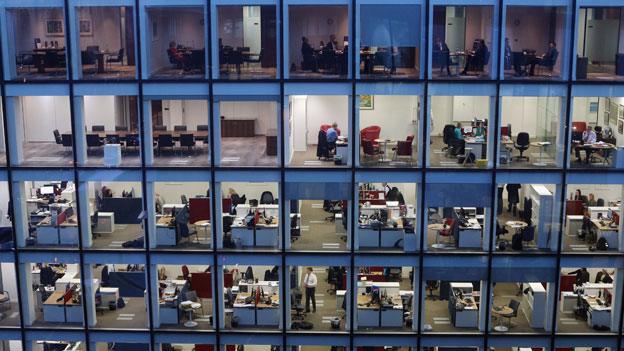Why firms don't want you to be brilliant at your job
- Published

Are those workers who stay for years with the same companies unambitious and mediocre, or does the corporate grind make them so? asks author and Financial Times columnist Lucy Kellaway.
Last week I talked to a graduate who had just started working for one of the most prestigious employers in the world. "How's it going?" I asked him.
He said it was fine, though all he had done in the past three weeks was sit in various rooms and be talked at by assorted people from the company.
The main thing that had struck him so far was that people seemed to get dimmer the higher they went in the organisation. I asked if he had any explanation for this and he said it was self-selection.
Really smart people don't stay at the institutions they have fought so hard to get into. The best leave within two or three years - the slightly less good stay a bit longer, and only the also-rans and the terminally unimaginative are in for the long haul.
Given that for nearly 30 years I have failed to peel off from a company that also hires some of the brightest graduates, this wasn't what I wanted to hear.
Increasing competition
I've been thinking about our conversation since, and have decided he may be on to something after all.
It is certainly true that the very cleverest now use top employers as a training ground and springboard - which was not the case when I was a graduate trainee.
Yet there are three other explanations for dwindling brilliance in big organisations that may be more important.
For a start, today's intake is simply better than it used to be.
There are more graduates competing for top jobs, which means they go to people who are academically accomplished, have notched up multiple internships, speak 16 languages, are dab hands at coding and have sailed the world single-handed.
The second explanation is not that the mediocre stay, but that staying makes them mediocre.
Being boring makes sense
Years of drudgery and late nights in the office have a way of taking the shine off any brilliance, and, in any case, there is no incentive to hang on to it as the corporate world doesn't rate it.
Rather than reward brilliance, it prefers skills that graduates can't see - good judgment, a nice way with clients, and an instinct for when to bite your lip.
Even if today's partners weren't boring to start off with, they quickly learn to seem that way.
The last reason is the one that troubles me most. It may not be true that the partners are miles dimmer than the graduates. It is just that the two can't talk to each other, and so are blind to each other's strengths.
It was always the case that the old and the young sometimes struggled to understand each other at work, but now it is more true than ever.

Bridging the age gap at work is getting harder, argues Lucy
The graduate trainees joining this year will be among the first to have grown up on the internet, which means they communicate differently, think differently, acquire knowledge differently and do different things with it.
They look at the partners and see slowness - the partners look at them and feel sad about their limited vocabulary, and wonder if they have ever read a book.
I met our own brilliant trainees a few days ago and for the first time I found myself slightly at sea.
As I banged on about the things that I think are interesting, I sensed they were looking at me oddly. They may have been thinking this woman is a dumb dinosaur, or not.
The trouble was I couldn't read them well enough to know one way or another.
Lucy Kellaway is an author and Financial Times columnist. Listen to her on Business Daily and World Business Report on BBC World Service every Monday.
- Published25 September 2014

- Published13 January 2014

- Published16 December 2013

- Published22 July 2013
